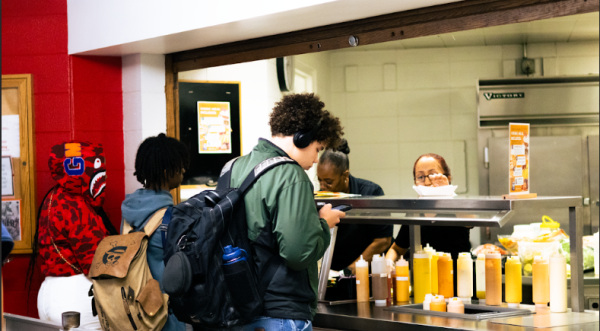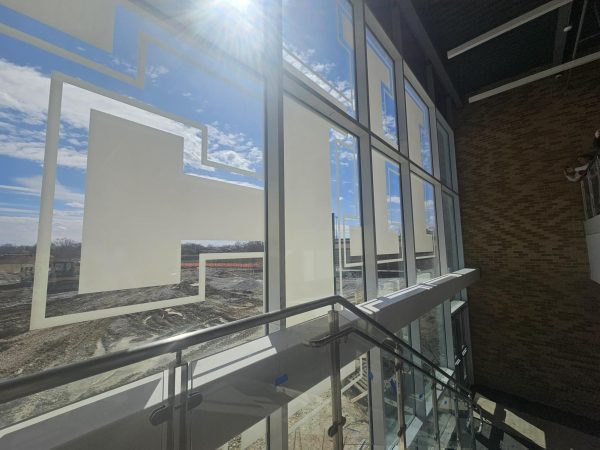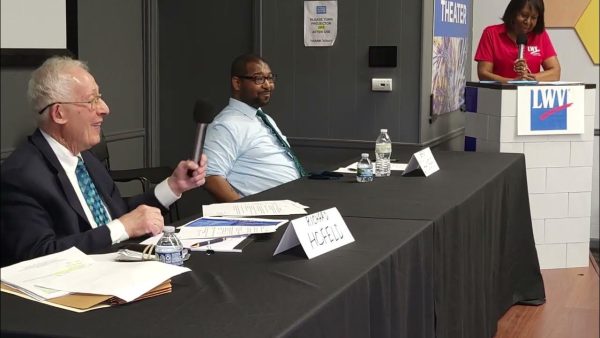H-F holds panel on legalization of marijuana
Due to the upcoming legalization of recreational marijuana in Illinois on Jan. 1, students in Principal’s Advisory Council were invited to attend a panel on Dec. 6 to answer their questions about how marijuana might affect their surroundings.
The panel consisted of professionals who have experience dealing with recreational and medical marijuana use. They were attorney Darcy Kriha, Dr. Bernard Heilieser, Dr. Michael Ward, Flossmoor Police Chief Tod Kamleiter, and community relations coordinator for Rosecrance Jennifer Hans.
Part of the panel was spent educating students on the different forms of marijuana such as topicals, edibles, and tinctures in a presentation given by Principal Dr. Jerry Lee Anderson.
Anderson said that although many students in Principal’s Advisory were already aware of marijuana’s many forms, she believes that “it’s still important to recognize and know that these things are out there.”
Anderson also briefly discussed the impact that vaping can have on a person becoming a smoker and the fact that the state of Illinois has one of the highest numbers of lung injury cases in the country. She also said one of the reasons adults are so concerned about young people beginning to use marijuana as adolescents is because it can be a gateway drug for some people.
She detailed some patterns she observed in students at her school in Colorado while serving as principal. For example, she said that students who used marijuana “could be very calm or volatile, had a change in their work habits, an impact on mental health and athletic performance, and had more acute reactions that required medical attention.”
Kriha is the writer of Ashley’s Law, an Illinois law that allows students with serious illnesses to take medical marijuana at school to relieve their plan. The law takes effect on Jan. 1 and can be given to students by the school nurse as long as they have a prescription.
Heilieser, an emergency medicine physician at Ingalls, said he had many concerns with the legalization of recreational marijuana, especially because he deals with “the bad stuff” in the ER.
“…You have no idea what could be in whatever you’re using. There could be cardiac drugs in there [marijuana], fentanyl, there could be things that will kill you. I want to see you guys at Jewel Osco, I don’t want to see you in the emergency department,”he said.
Ward, a family medicine doctor affiliated with Advocate Suburban Hospital and team physician for H-F football, said he deals more with the long term effects of marijuana use such as “delayed reaction time, inability to focus, and short term memory loss” as a primary care physician.
“Now we’re seeing more problems with marijuana from students taking medical marijuana from their parents and using it and now that they’re going to legalize it [recreational marijuana] the biggest problems we may see is the toxins that may come from purchasing someone’s marijuana who has grown it in their backyard maybe using pesticides…or lacing it…,” Ward said.
Recreational marijuana will be legal for those 21 years of age and older. Flossmoor police chief Kamleiter discussed the consequences for people using marijuana who are under 21.
“With the legalization of marijuana we have drafted some pretty robust ordinances that mirror the state law…the possession of any amount of cannabis for [people] under the age of 21 is potentially a $750 fine,” Kamleiter said.
He also said that people under the age of 21 shouldn’t be “excited” about the legalization of marijuana.
Another topic the panel touched on is the effect marijuana and other substance use can have on the brain.
“The teenage brain is developing until age 25…when there is substance use whether it be nicotine, marijuana or other substances, it’s changing the actual brain development,” Hans said. “Adolescents who begin using substances at around the age of 13 have a 47 percent risk of developing a severe substance use disorder, if it’s 17 they still have a 25 percent risk.”
Associate principal Craig Fantin encouraged students that may have a substance abuse problem to seek help.
“If you have a problem, reach out to one of the adults in the building. They will direct you where to go. I can guarantee that you’re not going to get in trouble,” he said. “We’re going to put you in the right position to be successful and hook you up with somebody that can help deal with your issues.”
Students were able to ask questions to the panel.





